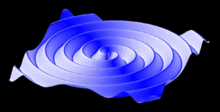Definify.com
Definition 2026
gravitational_wave
gravitational wave
English

A visualization of a gravitational wave as a fluctuation in spacetime, based on an animation produced by the National Aeronautics and Space Administration (NASA)
Noun
gravitational wave (plural gravitational waves)
- (physics) A fluctuation in spacetime caused by accelerating mass, which propagates as a wave at the speed of light.
- 1941, Leopold Infeld, Quest: The Evolution of a Scientist, New York, N.Y.: Doubleday, Doran & Co., OCLC 727959, page 261:
- It is therefore apparent that the existence of gravitational waves can be deduced from general relativity just as the existence of electromagnetic waves can be deduced from Maxwell's theory.
- 1949, Edmund [Taylor] Whittaker, From Euclid to Eddington: A Study of Conceptions of the External World, Cambridge: Cambridge University Press, OCLC 1097056, page 119:
- It might be anticipated that a pulsating star, such as a Cepheid is believed to be, would emit gravitational waves abundantly; but when the question is examined analytically, this expectation is not confirmed.
- 2003, John W. Mason, editor, Astrophysics Update, Berlin: Springer-Verlag; Chichester, West Sussex: Praxis Publishing, ISBN 978-3-540-40642-6, page 282:
- Fourth, there exists a strong competition on the side of purely astronomical means for indirect detection of gravitational waves.
- 2011, Jolien D[onald] E[arl] Creighton; Warren G. Anderson, “Gravitational Waves”, in Gravitational-Wave Physics and Astronomy: An Introduction to Theory, Experiment and Data Analysis, Weinheim: Wiley-VCH, ISBN 978-3-527-40886-3:
- A gravitational-wave detector exploits the physical effects of a gravitational wave on bodies to detect the waves. A gravitational wave detector may, for example, monitor the separation between two freely falling bodies; as a gravitational wave passes, the two bodies will experience a tidal acceleration relative to each other.
- 2016 February 11, Tim Radford, “Gravitational waves: discovery hailed as breakthrough of the century: Scientists announce discovery of clear gravitational wave signal, ripples in spacetime first predicted by Albert Einstein”, in The Guardian, London:
- Physicists have announced the discovery of gravitational waves, ripples in spacetime first anticipated by Albert Einstein a century ago. “We have detected gravitational waves. We did it,” said David Reitze, executive director of the Laser Interferometer Gravitational-Wave Observatory (Ligo), at a press conference in Washington.
-
- (dated, proscribed) A gravity wave.
- 1951, Donald E. Kerr, editor, Propagation of Short Radio Waves [IEE Electromagnetic Waves Series; 24], London: Peter Peregrinus Ltd on behalf of The Institution of Electrical Engineers, ISBN 978-0-86341-099-4, page 346:
- These layers also permit visual observation of the well-known "gravitational waves," which were suggested by Helmholtz and have been investigated theoretically at some length. It is frequently suggested that these atmospheric waves may be connected with signal fading.
- 1953, J[ohan] G[erard Jozef] Scholte, “On Theories of the Origin of Microseisms”, in James T. Wilson, editor, Symposium on Microseisms: Held at Arden House Harriman N.Y. 4–6 September 1952 [Publication (National Research Council); 306], Washington, D.C.: National Academy of Sciences, National Research Council, OCLC 12560485, page 124:
- It is difficult to see whether a sufficient amount of energy is communicated to the sea by the air masses directly in the form of compressional waves or it is transmitted or increased by the action of gravitational waves.
- 1959, K. Hinkelmann, “Ein numerisches Experiment mit den primitiven Gleichungen”, in Bert Bolin, editor, The Atmosphere and the Sea in Motion: Scientific Contributions to the Rossby Memorial Volume, New York, N.Y.: The Rockefeller Institute Press in association with Oxford University Press, OCLC 321475, abstract, page 486:
- In the used model sound waves and external gravitational waves have been filtered; combined inertial-internal gravitational waves, however, are still included in the equations.
-
Usage notes
The term gravity wave is sometimes used as a synonym for gravitational wave, and vice versa. However, gravity wave generally refers to the waves formed where two fluids meet under gravity, such as wind waves on the ocean surface, and use of the term to describe the astrophysical phenomenon is proscribed.[1]
Derived terms
- (spacetime): GW
Translations
fluctuation in spacetime that propagates as a wave at the speed of light
|
|
References
- ↑ Ian O'Neill (8 February 2016), “Gravitational Waves vs. Gravity Waves: Know the Difference!”, in Discovery Channel, archived from the original on 10 February 2016.